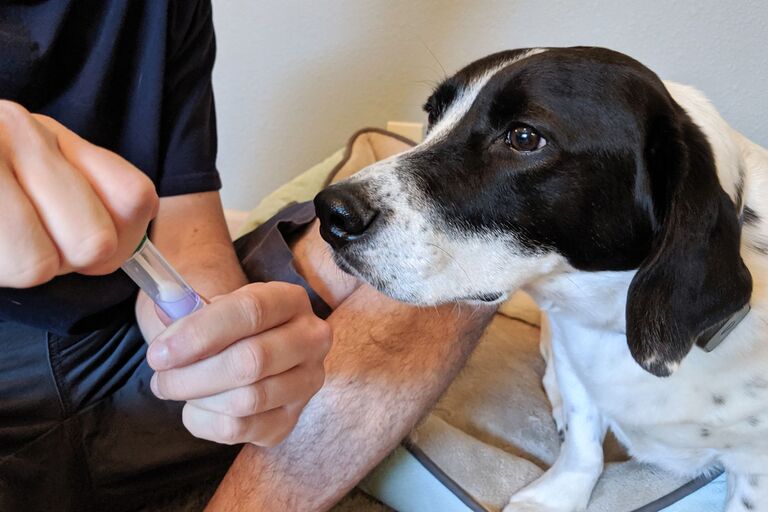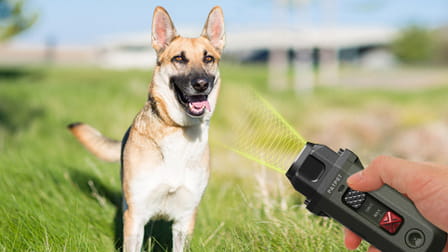Different from human DNA testing, the goal of dog DNA testing is mainly done to learn about their ancestry and family heritage. Specifically, they are used through the Dog DNA Test Kit.
The Dog DNA Test Kit helps to identify the exact breed within the genetics of a dog's genetic mutation. At the same time, DNA testing also checks companion animals for a variety of specific genetic diseases or disorders or genetic mutations. As some dogs may carry these diseases or be at risk of developing a full-blown disorder. Thanks to a DNA test, it can rule that out or spot the disease before it happens.
Below we've looked at some of the DNA testing services to see how they work, further evaluating them for ease of use, data presentation, and matching test results. Consistency on How To Choose Dog DNA Test Kit
1. What is a dog DNA test?

To get started on understanding what a canine DNA test is, we should start with a quick biology lesson. Deoxyribonucleic acid, aka DNA, carries the 'blueprint' for all living things, and genes are fragments of DNA that serve as the basic genetic unit; dogs have between 20,000 and 25,000 genes.
The canine DNA test is identical to the human test, with the only minor difference being that the technology has been adapted to the dog's genome. These tests look for markers in canine DNA and compare them with a database to provide detailed information about a dog's breed trait or health condition.
2. How does it work?

Simply order a kit, register for a unique code, and use the supplied cotton swab to collect a saliva sample from your dog. Once the sample is collected, you should send it back to the company's lab, where the DNA will be extracted and analyzed.
3. Things to remember when getting the results
Your dog's test results don't decide their destiny

Dog DNA testing can help satisfy everyone's curiosity. They are quite interesting but remember that breed is not everything after you get those breed results.
Sometimes breeds that have been stigmatized in the past, such as the Pitbull Terrier and the American Staffordshire Terrier, can alert pet parents if they show up in a breed incident. But some evidence suggests that these breeds make great pets with proper socialization, just as much as a Lab or a Chihuahua.
All in all, this isn't going to help you learn more about your dog either, but it doesn't always explain everything.
Dog DNA testing can provide clues to the ideal dog lifestyle

Thanks to testing, you know your dog's breed not only satisfies the curiosity of pet parents but also provides useful information. Many VCA hospitals note that cross-breed combinations "can help owners develop a more precise pet's diet, health, and preventive care plan."
Besides, different breeds have different lifestyles, like Labrador Retrievers, bred to help fishermen, and live to visit local swimming holes. Beagles have their hunting instincts with an intense feeding drive.
And Pugs were born to roam on the couch. Learning more about the breeds that show up in your dog's test results is half the fun of testing your dog's DNA. This captures clues about your dog's behavior that only strengthens your relationship.
When facing a health risk, see the experts

While a dog's DNA test can help you take a powerful preventative measure against your dog's health, it's important not to panic about any health risks that appear in their results.
You certainly can't avoid the complications involved, and as the American Kennel Club says about DNA health tests: "research is still in its infancy." Some testing companies keep their methods secret, which means it is difficult to verify the accuracy of their results. The AKC warns of "the level of anxiety, heartbreak and sometimes false confidence that these tests can confound".
Certain breeds are indeed susceptible to health risks, like Dachshunds and their back problems.
Or a serious disease in dogs called degenerative myelopathy (DM). DM is a debilitating spinal condition that leads to paralysis in older dogs. The researchers connected a mutation in a certain gene to DM, and DNA testing can tell owners if a dog is a carrier and at risk for DM.
What's more, if a dog has the mutation, they don't necessarily develop the disease. So look at every dog's DNA health test results with a pinch of salt and see your vet when you have concerns. Taking your pet to the vet can provide a comprehensive health check-up during a routine check-up. After all, regular checkups give you more insight into your dog's health than DNA test results.
4. How to use a DNA test
Confirming parentage

There is a technology called genetic fingerprinting that is used by law enforcement around the world to actively identify criminal suspects.
There is also a similar technology that can be used to provide a snapshot of the DNA of any dog or person. It helps in the identification of a dog, accurate pedigree tracking, and bloodline confirmation.
DNA testing to confirm parentage does not use actual genes, using other DNA sequences called markers. These are not functional genes, so DNA profiles are used only to verify genetic identity and pedigree. Do not provide any information about appearance, genetic disease, or breed.
Enforcement of pet waste laws

Use to put your finger in legal mockery. Landlords can register each resident's dog in the pet registry. If waste is found where it doesn't belong, a cell sample extracted from the stool can be compared to an individual in a local canine genetic profiling database.
Determination of admixture in mixed-breed dogs

DNA testing is available to reveal the breeds that gave rise to the dogs nicknamed "Heinz 57s". The AKC can designate these dogs as Canine Partners. The Wisdom Panel, owned by Mars Inc., includes all AKC-registered varieties, or rarer varieties on the Foundation Stock Service list.
Each test costs about $85, Wisdom Panel has sold about 400,000 since the company launched in 2007. Wisdom Panel also has other similar checks available online.
Knowing the breed will allow owners to make smart choices, based on the breed, in terms of health care and training. Also, it gives puppy owners an idea of the adult dog's great abilities.
Detecting genetic diseases

Often the choice of male or female breed depends on the breeder. Genetic testing plays a huge role in letting breeders know that there may be a tendency for a disease hidden in the dog's DNA.
Since then, Animal Orthopedic Organizers, Inc., founded in 1966 as the orthopedic problem, or dysplasia, control database, now maintains autologous database wishes about the dog's health, some based on X-Rays, some based on genetic tests.
Revealing hidden traits

DNA tests are available to detect genes for coat color and coat type. Some dogs may look like a certain color but may carry genes for a different color, style, or texture that may show up in offspring.
Nutritional and Weight recommendations

DNA testing can also provide important information about your dog's weight. And you can predict your dog's adult weight, which is especially helpful if you're checking on your puppy. At the same time, you can also get recommendations for the ideal weight range to let you know how much your dog should weigh to be healthy.
At the same time, DNA testing also provides nutritional considerations based on dog size and breed mix. Some recommendations include nutrients and minerals to help with digestion, joints, and skin.
Conclusion
In a nutshell, pet standards are on the rise and we're not just talking about essentials like puppy gear, or aesthetics with accessories, but seasonal must-haves.
To understand and care for our puppies and to do that, we have come up with the How to Choose Dog DNA Test Kit, which uses home saliva analysis kits to report on the lineage,track, health, and even the dog's personality. We hope the above information becomes useful and interesting for you.













